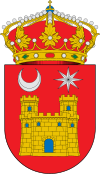Alarcón
| Alarcón | ||
|---|---|---|

General view of Alarcón.
|
||
|
||
| Location of Alarcón in Spain. | ||
| Coordinates: 39°33′N 2°5′W / 39.550°N 2.083°W | ||
| Country | Spain | |
| Autonomous community | Castilla–La Mancha | |
| Province | Cuenca | |
| Comarca | La Manchuela | |
| Government | ||
| • Mayor | Pedro María Párraga Villajos | |
| Area | ||
| • Total | 120 km2 (50 sq mi) | |
| Elevation | 831 m (2,726 ft) | |
| Population (2013) | ||
| • Total | 159 | |
| • Density | 1.3/km2 (3.4/sq mi) | |
| Time zone | CET (UTC+1) | |
| • Summer (DST) | CEST (UTC+2) | |
| Bien de interés cultural | RI-53-0000247 as a Historic-Artistic Grouping since July 3, 1981 | |
| Website | Official website | |
Alarcón is a municipality in the province of Cuenca, in the autonomous community of Castilla-La Mancha, Spain.
Located 87 kilometers (54 miles) south of the city of Cuenca, Alarcón spans an area of 120 km² (50 sq mi) at an elevation of 831 meters (2,726 feet). It is situated on a promontory within a closed bend of the Júcar River. Not far downstream from the Alarcón Dam, an important reservoir, the town also has the smaller Dam of Henchidero at its doorstep.
According to the 2013 municipal registry of the National Statistics Institute (INE, Instituto Nacional de Estadística), the town population of 159 inhabitants yields a density of 1.3 people per km² (3.4 per sq mi).
Of Iberian and Roman origins, Alarcón first appears in recorded history at its occupation by the Arabs, to whom it owes the construction of the primitive castle on which the existing one is based. The history of Alarcón is governed by its role as a stronghold; however, the castle is not the town’s only precious heritage: it also claims a rich architectural variety, both religious (the Churches of Santo Domingo de Silos, San Juan Bautista, the Santa Trinidad, and Santa María del Campo, as well as the Hermitage of Santa María de la Orden), and civil (the town hall, the House of Villena, and the Castañeda Palace).
...
Wikipedia


